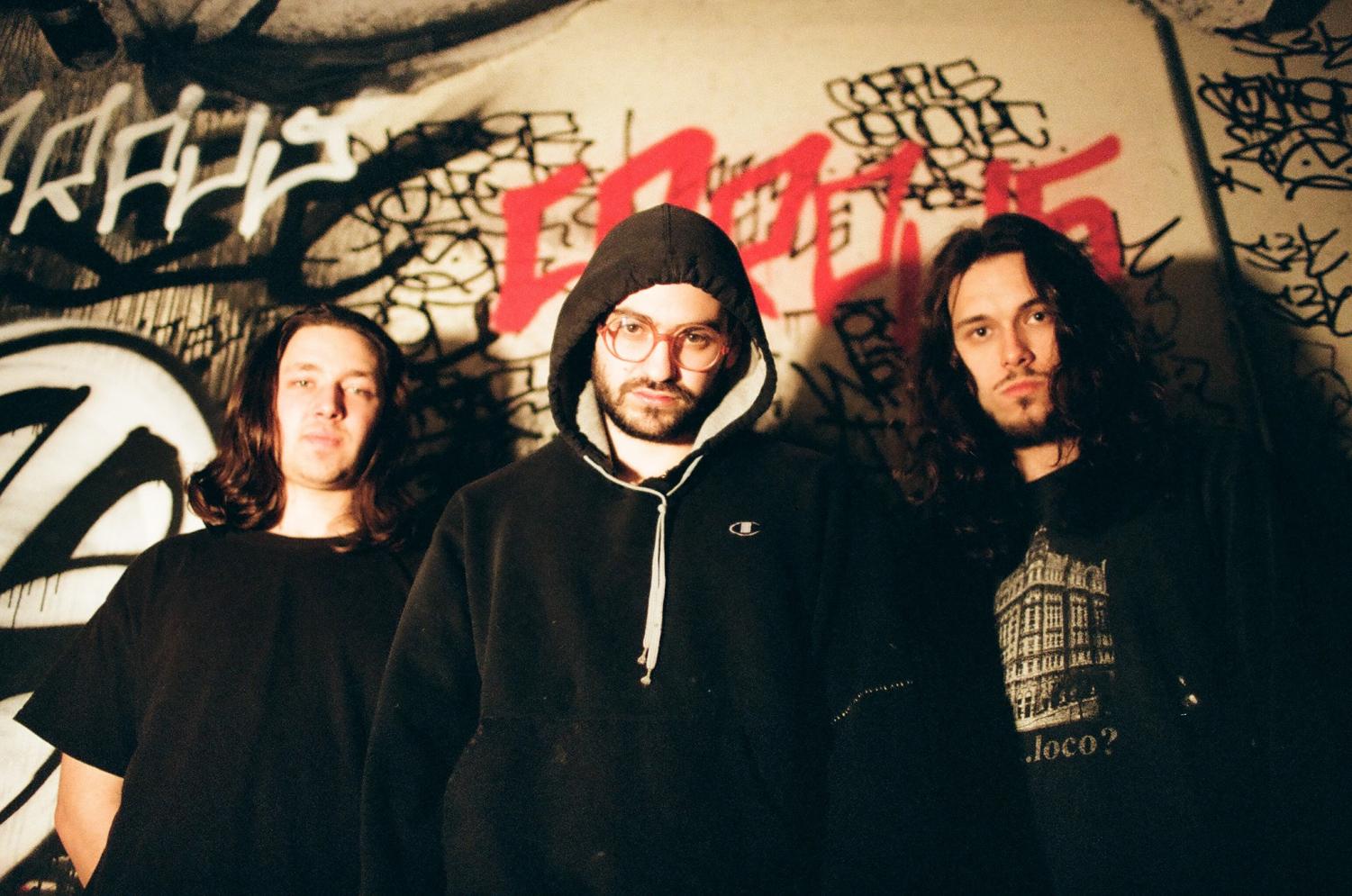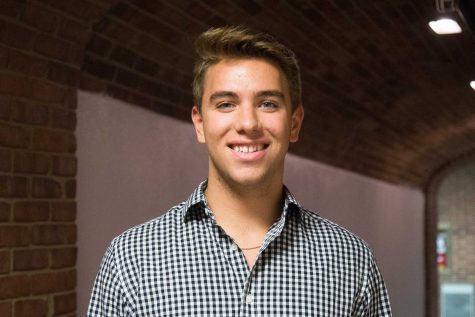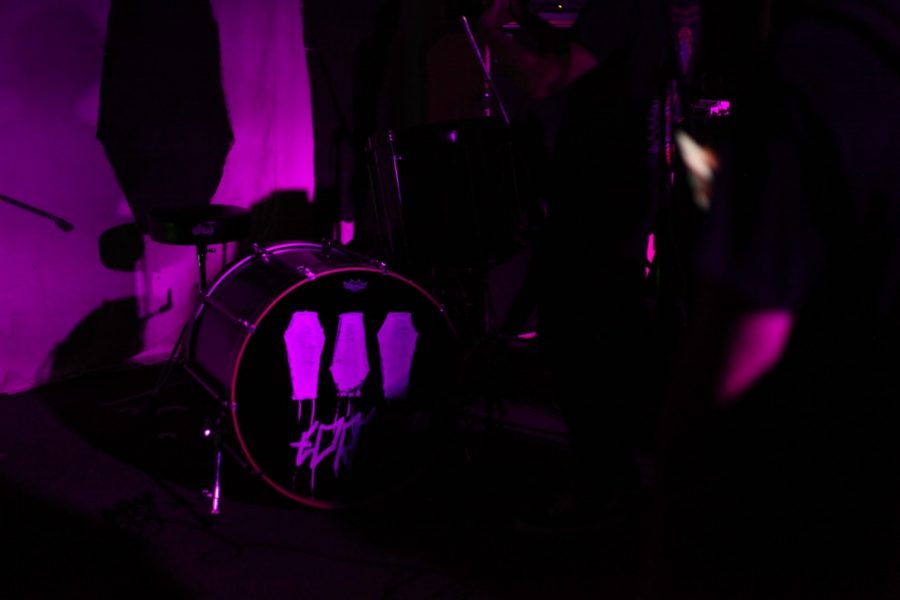Perhaps no band in the past couple years has disrupted underground music in the same way that Show Me the Body has. The New York trio combines the sounds of hardcore punk, metal, harsh noise and hip-hop into a discography that sees features from South Florida rapper Denzel Curry and harsh noise mainstay Dreamcrusher on the same tracklist. Their strict DIY ethos, outspoken politics and rowdy shows — shows that often forego a traditional venue — have earned them a rabid following, with fans tagging the band’s logo all over their respective hometowns. On May 7, the band will play Drkmttr over in East Nashville. Their frontman Julian called us from their tour van to talk about community, conflict and Passover, among other things.
Vanderbilt Hustler: Where are you right now?
Julian Cashwan Pratt: We are in Idaho. We would have had a day off but these kids in Boise, Idaho hit us up about playing someone’s mom’s house. So we’re headed there to do that.
VH: So you guys are from New York and I’m from New Jersey, and one of the biggest things that I found when I moved down here was that there aren’t really any good bagels in the South. I’m not sure if it’s something you’ve noticed, but it’s pretty terrible.
JCP: Oh, man, I don’t get bagels when I’m away from home. I mean we go cold turkey on the bagel game when we’re not New York. Some people in Montreal tried to tell us that we should eat their bagels. They’re full of shit, man. Those are bialys man. Those people never heard of a bialy.
VH: With Passover coming up this weekend. I was wondering what do you guys do about like high holidays when you’re on tour.
JCP: We try to like try to, like, take some moments, you know, try to do something but it definitely can be hard to participate, But, you know, the most important thing for us is just to take a moment and think about our families and stuff like that, I usually call my mom and stuff, you know, just take take a moment from working, and just try to try to really think about what it means to be doing what we’re doing now and have the freedom to do it, stuff like that.
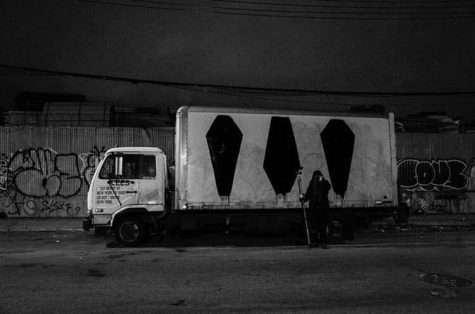
VH: For the show on May 7 you guys have Gnarwhal, Kent Osborne and Thirdface opening, all Nashville locals. Do you guys do you know those guys? Have you played with them before before?
JCP: We know we know Thirdface and we know the homegirl Kathryn [Edwards] who put it together whose gang runs Drkmttr. So last year, we we got booked to headline their Nameless Festival, which is like, that’s what their collective puts on. And so we came down to Nashville and like met their whole crew and we just like fell in love with their crew. Their whole squad is just like a bunch of kids in bands. Like it’s like helping each other out and like working, just making shows and like doing their own fucking thing. So that was like super inspirational for us because that’s what we do in New York. So just super cool to meet other kids in another city and like feel like the hustle is similar, you know.
So for other shows we have bands that are like – we’re doing Texas with Skeleton. We’re doing the West Coast with Smut and Enemy. We’re doing the East Coast with a hardcore band called Symbiote, but for this show, we just left it up to them, because we respect and trust whatever they want to put together.
VH: So right now, I think what we’re seeing a lot in Nashville probably mirrors a lot of what you’re seeing New York. When you come down here Nashville is definitely facing a lot of like gentrification. I would even argue that like the whole reason Drkmttr had to move was part of that. The neighborhood they were in is just becoming super popular and all these super wealthy high-rise apartment contracting companies are pushing people out and that’s why they went all the way across the river. So I just wanted to hear what you thought about that in your own experiences in New York and places that you’ve been since it’s something you talk about a lot in interviews and a lot in your music. What do you think creating these spaces for shows and having collectives like Corpus. What is your endgame?
JCP: I mean it’s really interesting because you’re talking about how the neighborhood that Drkmttr was in became cool. And you know, that’s how it goes like in all cities, you know, it’s like the punks move in and they’re usually like the first group of white people who will then signal to the other white people that it’s semi-safe neighborhood and then the other white people with more money come in. While doing this, you have to recognize that you have hand in the destruction of a community, or you can if you’re not careful. And so I’m not blaming anyone for that, but I think that’s the reason why people like Drkmttr Collective exist. The reason why Corpus exists is because these are things where we acknowledge the different entities for deterioration of our community and of our city that we can even have a hand in as we invite other people into these spaces, you know? So I think that in creating something like Corpus, it’s really about protection. It’s about being in touch with the community around you so that you set up something that really matters for that community not just something that matters for the community to come or the changing city, but something that actually holds weight for people who have been there for years, people who are born into these places, people who are endemic to a city.
You have to make sure that what you do is in devotion to that city—what you do is in devotion to the people who need that space. Because if it’s not, it’s automatically in devotion to money. It’s automatically in devotion to rebuilding the city, making it newly cool. So you have to make that covenant with yourself and with your community every fucking day. Otherwise, it’s very easy to get off that course.
VH: What do you think we can do about it? What if some big business is going to comes and starts throwing their money around and all of a sudden the neighborhood around you starts to change?
JCP: Well, there’s a lot of things you can do. You can talk with a community have an actual dialogue with people living there, start a bond that is like really powerful. There’s nothing more powerful than having literal bodies come together, like, that is the essence of like how shit works, how people can fight back is by coming together. So many things like classism and racism are used to divide individuals. But like when we talk, when two communities can come together for a sole purpose of protection, that’s like the most important and meaningful, powerful thing that we could do as individuals.
You can do something that happens in other countries and in some cities like New York and Seattle and happens a lot in other countries, in Italy and in Germany, where people fucking throw bricks, people destroy property of corporate culture, which is a 100% valid in our book. Property destruction is a right of a city. If people don’t want it there, they have the right to destroy it.
Property destruction is a right of a city. If people don’t want it there, they have the right to destroy it.
VH: A lot of like what you talk about in your music is very much indebted to New York. I feel like you’ve now like become a band that represents a lot of New York culture and we see a lot of what we just talked about, a lot of those issues that are happening in New York, are happening in other cities, and now you’re finally getting a chance to go and see those cities. How do you like try to represent New York and what about your band and your aesthetic and your music do you think New York is ingrained in that you try to bring to share with people.
JCP: I think it’s not about tough shit, and it’s not even only about punk rock or hardcore shit. Like, it’s really about love. It’s about understanding and it’s about the fucking freaks. It’s about creating an environment and a sound in a place where everybody is welcome to bug out and everybody can bug out in their own way that they need to feel free and complete. So many scenes like even in New York, as Show Me the Body was younger, we got looked down on so much just for being freaks and doing our own thing and not participating in like the straight ahead punk rock or hardcore culture, but that’s because we had to, we do our own thing because we didn’t have a choice. We just wanted to be ourselves. So I think what we can give to other people is the ability to participate in our band, to participate in Corpus, but also be your own fucking self. That you don’t have to try to be anything that you’re not. When we go to other cities, we love to hear kids love where they’re from. I don’t even I don’t like to talk to people about New York when I’m in there city. I like to talk to them about where they’re from, learn about what’s beautiful about their place, where they live.
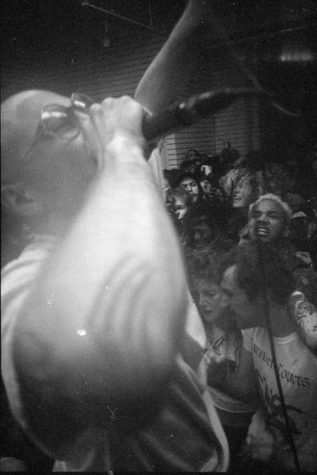
VH: Some of the things you mention in your music and in your interviews, people would consider controversial and you’re going out to Idaho now, you’re coming down in Nashville, you go even further south and you’re going into places that are very much not of the same mindset.
JCP: I’ll tell you this: kids want to be of that mindset everywhere. Everybody wants to be free, even the even cats who have homophobia ingrained in them. Even those cats want to be free even though they’re not ready to be. So it’s about making yourself available. We’re just making ourselves available for anybody who wants to get down with us.
VH: Do you guys ever like receive any like push back in place you go to? Are there people coming after you like at shows or like afterwards or in your comment sections or whatever or has the response been largely like positive?
JCP: I think the response is usually positive. There’s always people who are like hardcore tough guys who will write it off and that’s fine because those people are supposed to write it off, you know what I mean? That’s fine by us. Those people are supposed to hate us. And I think that only strengthens the people who do connect to it and I think we usually just get a positive response because I think even people who grew up on like hardcore tough-guy stuff are even like ‘Damn, that’s cool that this is not that,’ a lot of the time. We haven’t really run into any super…it’s super minimal backlash that we’ve run into, I’m trying to think of like any kind of experience.
I wouldn’t even call this backlash, but I think this is a really interesting moment. Actually, the first concert ever in Show Me the Body’s history that we were on a marquee we were at the Dallas Theater and it was a super cool spot as when we were on tour with our homie B L A C K I E — Michael LaCour from Houston, Texas. He’s an amazing performer. He now goes by Michael LaCour. But he’s been a wonderful mentor to us over the years and a friend.
So we were on tour with him and I can’t remember the year exactly, but I guess it was around 2016-ish or something like that when Ferguson was still happening and people start killing police and there were a couple of Dallas police officers who got shot, and bless their families. We don’t wish sorrow on anybody. But at this marquee, on one side, it said ‘Show Me the Body’ and ‘B L A C K I E’, and then on the other side, it says ‘Dallas Theater stands with the Dallas Police’, and that was really jarring for us, because 1. It was our first marquee but 2. It made us very uncomfortable, so near the end of the show I made a point to say ‘Thank you for having us and thank you Dallas for having us and we understand everything that Dallas going through and or you know, we can’t imagine what Dallas going through but we’re trying to understand it.’ But I also said, ‘I have to say this, that we don’t stand with police dead or alive, you know, like we stand with black people and working class people in Dallas. We don’t stand with no cops, ever. And nobody said anything, there was maybe one girl in the back who hollered but it was silence, pure silence, silence during a Show Me the Body concert. It was kind of weird.
And after the show, one by one, trickle by trickle kids start coming up to us saying, — mind you, they didn’t say anything when I said this, it was crickets when I said it — then almost everybody at the show came up to me afterwards to say, like, ‘Thanks for saying something about that, like that made everybody uncomfortable. Thank you for saying something.’ But I never experienced that, where kids were fearful to express that, you know? The kids were fearful to express their feelings in their beliefs about about authority, and that was really striking to me. Coming from New York, we’re loud mouths, you know what I mean? Like, we say it all, so that was really striking to be in a place where kids felt unsafe to say how they really felt and I was pretty amazed.
Show Me the Body released their second full-length album Dog Whistle earlier this year. They will perform at Drkmttr on May 7 with Gnarwhal, Kent Osborne and Thirdface at 7pm.


